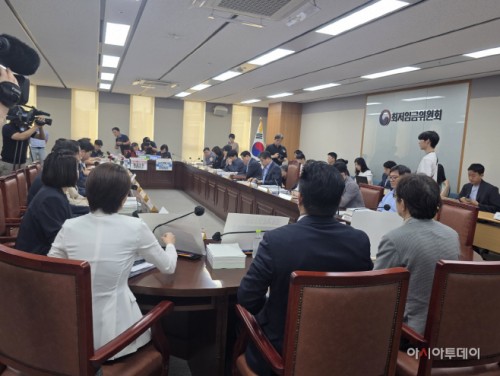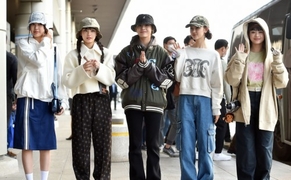 |
| The 8th plenary session of the Minimum Wage Commission is held at the Government Complex Sejong on July 1. / Photo by Lee Ha-eun |
Labor and business representatives failed to reach an agreement on South Korea’s 2026 minimum wage, missing the June 29 legal deadline, even after exchanging four rounds of revised proposals. With the gap still wide, attention is now turning to public interest commissioners, who may step in with a mediation proposal as early as the next session on July 3.
At the 8th plenary session of the Minimum Wage Commission, held on July 1 at the Government Complex Sejong, labor representatives proposed a fourth revised hourly wage of 11,260 won—a 12.3% increase—while business representatives suggested 10,110 won, a modest 0.8% rise. The gap between the two stands at 1,150 won, down slightly from the previous 1,390-won difference but still significant.
The commission’s process involves both sides submitting revised proposals in hopes of narrowing the gap. If no agreement is reached, the public interest commissioners present a “deliberation facilitation range,” within which both sides submit final proposals for a vote—a method that was also used last year.
Earlier in the same session, labor and business presented third revised offers of 11,360 won and 10,090 won, respectively, but failed to agree. Both sides then offered one more revision, but no progress was made, and the meeting ended without a resolution.
After the session, Ryu Ki-seop, secretary-general of the Federation of Korean Trade Unions, told reporters that “labor’s expectations have risen with the change in administration, while management is clinging to economic uncertainty.” He added, “There’s no point in continuing at this pace,” noting that a fifth revised offer may be prepared for the next session, depending on whether public interest commissioners choose to intervene.
Tensions remained high during the talks. Labor representatives called for real wage hikes, citing rising living costs, while business groups warned of job losses, particularly in small businesses. With both sides reiterating their positions, no substantive compromise was reached.
Lee Mi-seon, vice chair of the Korean Confederation of Trade Unions, said, “In a country where the minimum wage is practically the maximum wage for many, it must at least guarantee a life of dignity.” Ryu also argued, “With the government preparing a 30 trillion-won supplementary budget to boost domestic demand, the commission must respond with a clear wage increase.”
Management, however, highlighted risks to employment. Ryu Ki-jung, an executive director at the Korea Employers Federation, said, “Even based on the four legal criteria, the current minimum wage is already high. It should be set with vulnerable small business owners in mind.” Lee Myung-ro of the Korea Federation of SMEs added, “Business owners are also suffering from inflation. Excessive increases could lead to fewer work hours or layoffs, ultimately shrinking employment.”
The commission was originally required to finalize the 2026 minimum wage by June 29, but missed the deadline amid the prolonged stalemate. Since the system was introduced, this legal deadline has only been met nine times. The labor minister must officially announce the 2026 wage by August 5, meaning a final decision should come no later than mid-July to allow time for administrative procedures and objections.
The Minimum Wage Commission will reconvene for its ninth plenary session on July 3.
Most Read
-
1
-
2
-
3
-
4
-
5
-
6
-
7





















